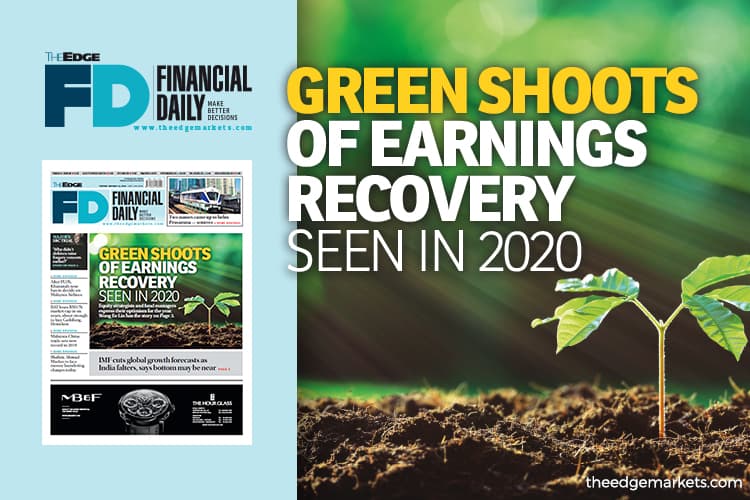
This article first appeared in The Edge Financial Daily on January 21, 2020
KUALA LUMPUR: After two consecutive years of disappointing corporate earnings performance, investment analysts see the green shoots of recovery in 2020 with estimates of a mid-single-digit growth.
Equity strategists and fund managers told The Edge Financial Daily that they are optimistic that 2020 will finally see a turnaround against a backdrop of stronger commodity prices, namely both the crude palm oil and crude oil.
TA Investment Management Bhd chief investment officer Choo Swee Kee pointed out that the broad earnings for 2019 are expected to be subdued due to the disruption in world trade and consolidation in the domestic economy.
However, Choo believes that corporate earnings are expected to be on the growth path in 2020. He anticipates earnings in the plantation and construction sectors to be better.
The softer CPO prices last year set a low base in 2020. Meanwhile, activities seem to be picking up in the construction sector. Higher crude palm oil (CPO) price and the award of mega public projects will benefit the two sectors respectively, said Choo.
CPO prices rebounded RM65 to RM2,902 per tonne yesterday. The edible oil has soared about 36% since October last year.
“We believe the government will try its best to promote growth in the country and this will provide positive earnings impact on the market, and this will likely have positive implications for the market,”said Choo. He expects better economic prospects for 2020 will help to drive corporate earnings growth as well.
Hong Leong Investment Bank forecasts a 6.4% earnings growth among the 30 component stocks of the FBM KLCI in 2020, in contrast to the 6% contraction last year.
Its head of research Jeremy Goh commented that there is modest upside for the benchmark index. He pegs the year-end target at 1,640 points.
“Apart from the anticipated earnings recovery, valuations are also at the lower end of the range. Both the P/E (price-to-earnings) and P/B (price-to-book) ratios are -1 and -1.5 standard deviations below historical mean.”
“Perhaps once corporates start to show initial signs of earnings recovery, the market upside should follow suit,” he added.
Last year, the KLCI was the worst performer among its regional peers. Three weeks into the new year, the benchmark index was still below the psychological 1,600-level and closed at 1,588.88 yesterday.
MIDF Research’s head of research Mohd Redza Abdul Rahman concurred that commodity prices will be the saviour of the local market and the tourism-related sectors, for instance, aviation and healthcare, in 2020.
“We will also likely see a recovery in banking earnings as a slew of infrastructure projects are rebooted, and the expectation of a rate cut will fuel loan growth,” said Redza.
For 2019, Redza noted that there could potentially be a marginal decline in corporate earnings growth, no thanks to the under par performance of the commodities price in the first half of last year.
He attributed the likelihood of contraction in corporate earnings to the manufacturing sector, especially the electronics and electrical (E&E) segment, which was affected by the trade war. It is worth noting that exports declined 8.9% for the first 11 months of 2019.
Likewise, Rakuten Trade’s head of research Kenny Yee anticipates corporate earnings to grow 5.7% in 2020, assuming that CPO and oil prices stay around the current levels.
He noted that corporate earnings are estimated to decline by 3.5% in 2019, weighed by earnings downgrades in Petronas-linked companies as well as lower earnings in plantation counters last year.
Yee believes that the KLCI will test the 1,700 in 2020, saying that the main catalyst will be the strengthening ringgit along with the appreciation of the Chinese renminbi.
“Our ringgit is still cheap. Foreign funds will sooner or later look for bargain hunting opportunities in Asia… or emerging markets, especially when things improve in relation to the US-China trade spat,” said Yee.
He noted that improvement in sentiment from the US-China trade war will strengthen China’s renminbi. “As the ringgit has a strong correlation with renminbi of almost 90%, we believe the ringgit will move alongside,” said Yee.
As at the time of writing, ringgit was at 4.0595 against the US dollar. The local currency has appreciated 3.2% since October last year.
On valuation, Yee said Malaysia is not seen as a prime destination for foreign funds, as it is trading at a premium compared with its regional peers. Nevertheless, he said the index is now trading at low valuations, compared with its past 12-months’.
“Our market still needs a longer time to warm up; we will only see the spillover effects later,” he said.